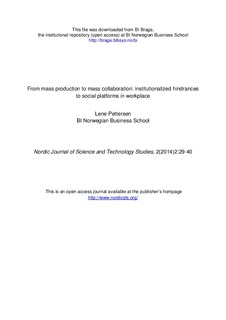From mass production to mass collaboration: institutionalized hindrances to social platforms in workplace
Journal article, Peer reviewed
Permanent lenke
http://hdl.handle.net/11250/293927Utgivelsesdato
2014Metadata
Vis full innførselSamlinger
- Scientific articles [2181]
Originalversjon
Nordic Journal of Science and Technology Studies, 2(2014)2:29-40Sammendrag
This article addresses the importance of institutionalized practices when social media
are introduced as collective platforms for the workplace. It examines why the great
engagement envisioned for these tools has yet to be realized in organizational settings.
The dynamics in the workplace and in distributed networks (e.g., Wikipedia, Linux) are
compared and found to operate with different social structures and different practices at
play. However, with the introduction of social platforms, collective and engaged actions
are expected from employees. The nature of our notion of work in the workplace is
colored by individual organization (employee-employer contract) and measurement of
time (work hours) and money (wage) derived from a capitalist paradigm, whereas drivers
at play in distributed networks are not measured in terms of quantity but quality (e.g.,
good work, strong reputation, high social status). The article presents a comprehensive
qualitative and longitudinal case study of knowledge workers employed at a knowledgeintensive
organization that operates in twenty-three countries in Europe, North Africa,
and the Middle East. Many of the employees in the study explained that the company’s
social media platform becomes just another object to track in an already hectic workday
in which individual drivers triumph over collective priorities.
Keywords:
Beskrivelse
This is an open access journal available at the publisher’s homepage http://www.nordicsts.org/
